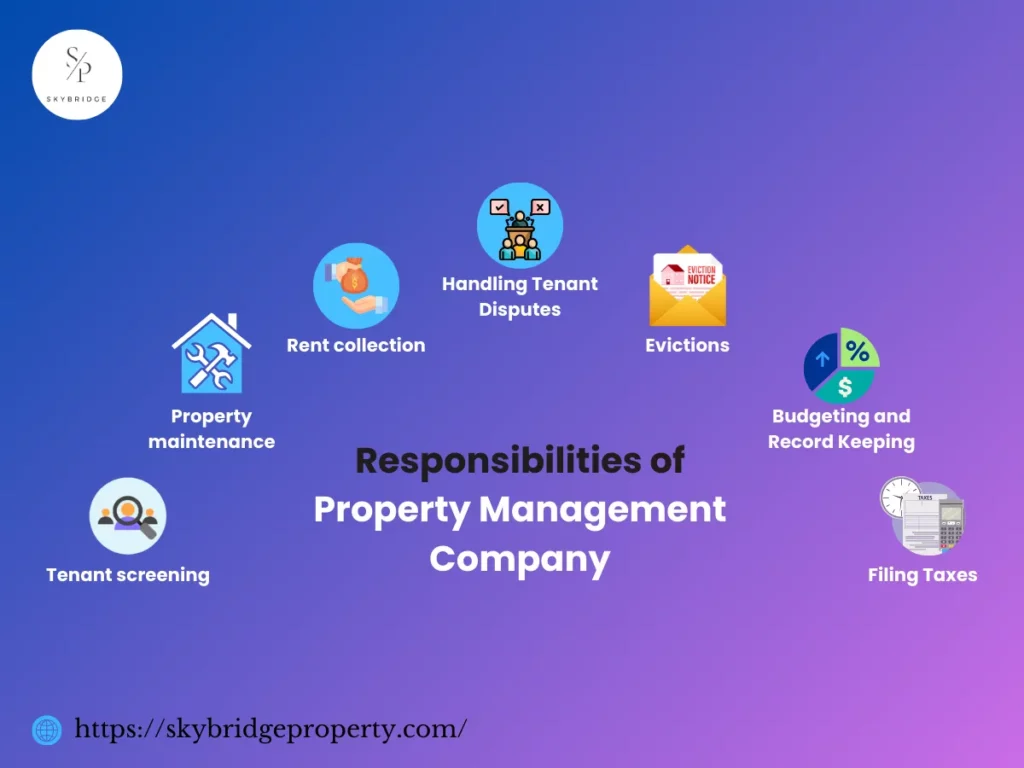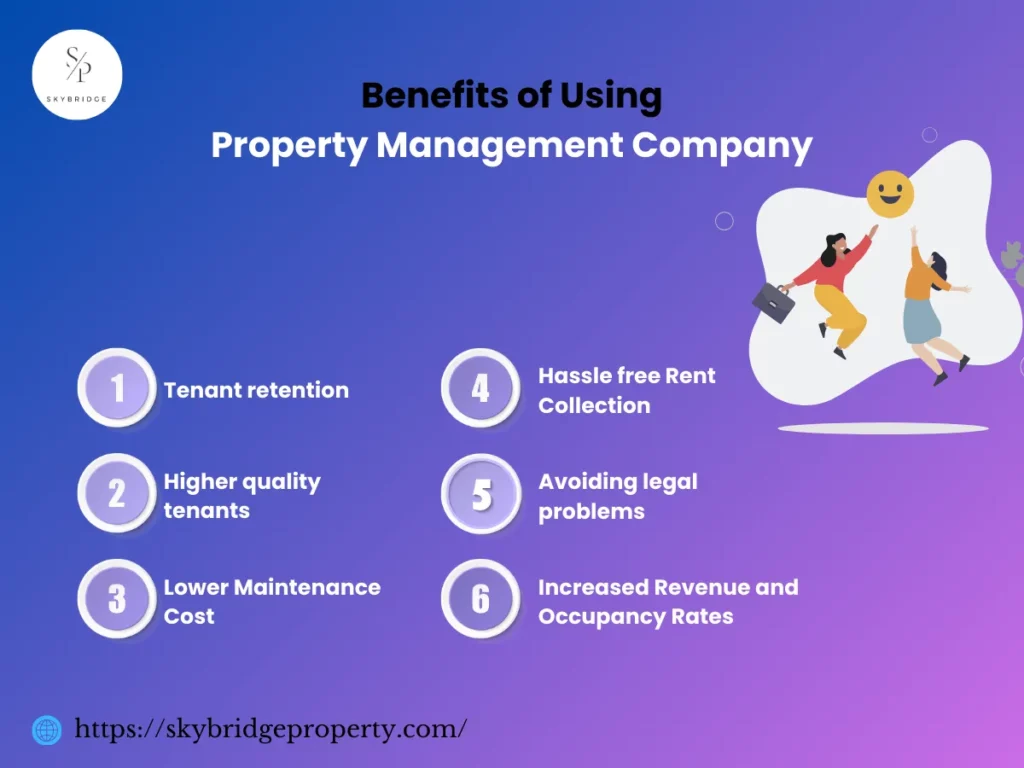Property management companies handle the day-to-day operations of rental properties on behalf of owners. A property manager is the professional responsible for overseeing these tasks, ensuring everything runs smoothly and efficiently. They take on a variety of duties, from screening tenants to managing maintenance requests, rent collection, and addressing tenant concerns. Essentially, they act as the liaison between property owners and tenants, making sure both parties’ needs are met.
A property manager’s role also includes ensuring compliance with local laws, handling lease agreements, and responding to emergencies. Their goal is to maintain the property’s value, secure reliable tenants, and maximize profitability for property owners. With their expertise, property management companies ensure that both tenants and owners experience a smooth, hassle-free process.
Responsibilities of Property Management Company
Property management companies play a vital role in ensuring that properties are well-maintained, tenants are satisfied, and owners are relieved of the daily responsibilities associated with rental properties.

The responsibilities of property management company are:
- Tenant screening
- Property maintenance
- Rent collection
- Handling Tenant Disputes
- Evictions
- Budgeting and Record Keeping
- Filing Taxes
Tenant Screening
Tenant screening is one of the most critical tasks of a property management company. Tenant screening is essential for ensuring that only reliable and trustworthy individuals occupy your property. By conducting thorough background checks, credit assessments, and reference verifications, property managers can significantly reduce the risk of tenant issues, such as late payments, property damage, or legal disputes.
Common tenant screening process are:
- Background checks: To identify any criminal history, ensuring that tenants are law-abiding.
- Credit checks: To evaluate whether potential tenants have a history of paying their bills on time, reducing the risk of non-payment.
- References: Verifying previous landlord references to gain insight into the applicant’s behavior and rental history.
Tenant screening ensures that property owners can trust their tenants to respect the property and fulfill their rental obligations, leading to a smooth and reliable leasing process.
Property Maintenance
Regular property maintenance is crucial in keeping the property in good condition, ensuring that tenants are comfortable, and preserving the long-term value of the property. Property management companies handle all aspects of property maintenance, including scheduling repairs, addressing emergencies, and implementing preventative maintenance plans to keep everything functioning optimally.
Some types of property maintenance are:
- Routine maintenance: Includes tasks such as cleaning gutters, servicing HVAC systems, and landscaping to ensure the property remains presentable and livable.
- Emergency repairs: Property managers are equipped to respond to urgent issues like plumbing leaks or electrical failures, preventing disruption for tenants and avoiding expensive damage.
- Preventative maintenance: By addressing minor issues before they become major problems, property managers help avoid costly repairs and extend the life of key property components.
Regular maintenance improves tenant satisfaction and reduces the chances of expensive, unexpected repair costs for the property owner.
Rent Collection
Rent collection is also another major responsibility of property management companies. Property Managers ensure that rent is collected on time, every time.
They offer various rent collection methods, such as:
- Online payment platforms: Allow tenants to easily pay rent via secure methods, providing convenience for both parties.
- Automated reminders: Property managers can send reminders before and after the due date to reduce late payments.
- Traditional methods: For tenants who prefer other payment forms, checks or money orders may still be an option.
By handling the rent collection process professionally, property managers reduce the risk of delays and ensure that the property owner receives their payments consistently. This not only provides property owners with predictable cash flow but also minimizes conflicts with tenants, creating a smoother rental experience.
Handling Tenant Disputes
Tenant disputes are common in rental properties, but property managers mediate disputes between tenants with a focus on resolving conflicts before they escalate. These disputes could involve issues like noise complaints, disagreements over property damage, or misunderstandings about lease terms.
Here is what property managers do to handle tenant disputes.
- Effective mediation: Property managers handle communication between tenants, ensuring that both parties understand their rights and responsibilities.
- Timely resolution: By addressing issues promptly, property managers help maintain good tenant relations and prevent minor conflicts from becoming larger problems.
The goal is to maintain a harmonious living environment for all tenants, which ultimately contributes to tenant retention and satisfaction.
Evictions
While evictions are never ideal, property management companies handle the eviction process when necessary. This process ensures that the property owner complies with the law while removing tenants who are not adhering to the lease agreement.
Key steps in the eviction process include:
- Notice issuance: Property managers issue formal notices to tenants for non-payment or lease violations, giving them time to correct the issue.
- Court procedures: If the issue isn’t resolved, property managers handle the legal steps, including court filings, and represent the property owner during hearings.
- Compliance with legal requirements: Evictions are carried out in accordance with local, state, and federal laws, protecting both the property owner and tenants’ rights.
By ensuring that evictions are handled professionally and legally, property management companies help protect owners from costly mistakes while maintaining fairness in the process.
Budgeting and Record Keeping
Property management companies are responsible for the financial aspects of property ownership, including budgeting for repairs, managing operational expenses, and maintaining detailed financial records.
Some key financial responsibilities of property management company are:
- Budgeting for repairs and maintenance: Property managers estimate and allocate funds for routine and emergency maintenance, ensuring that the property stays in good condition without unexpected costs.
- Tracking expenses: They keep a record of all expenditures related to the property, such as repair bills, service contracts, and utility payments.
- Financial transparency: Owners receive detailed reports on income and expenses, helping them make informed decisions about their investment.
By taking care of the financial side of property management, property managers help ensure that the property remains profitable and that expenses are kept under control.
Filing Taxes
Property management companies also offer tax preparation services, helping property owners track deductible expenses and prepare reports for tax filing. These services are invaluable, especially when it comes to complex tax codes related to property ownership.
Tax filing responsibilities of property management companies include:
- Tracking deductible expenses: Property managers track all expenses related to the property, including maintenance costs, property improvements, and management fees.
- Providing tax reports: At the end of the year, property management companies provide detailed financial reports, simplifying the tax filing process for property owners and ensuring they take advantage of all available deductions.
This comprehensive tax support helps property owners minimize their tax burden while ensuring that they remain compliant with tax laws.
Benefits of Using Property Management Company
Hiring a property management company provides several significant advantages for property owners, from increasing profitability to minimizing the stress of day-to-day operations.

Benefits of using property management company are:
- Tenant retention
- Higher quality tenants
- Lower Maintenance Cost
- Hassle free Rent Collection
- Avoiding legal problems
- Increased Revenue and Occupancy Rates
Tenant Retention: Property management companies work hard to keep tenants happy, which is crucial for ensuring long-term tenancy and reducing vacancy rates. They handle tenant needs promptly, maintain open communication, and resolve issues quickly, creating a positive living experience. A satisfied tenant is more likely to renew their lease, resulting in fewer vacancies and the added stability of consistent income for property owners.
Higher Quality Tenants: Through thorough tenant screening processes, property management companies are able to attract better-quality tenants. This includes background checks, credit assessments, and verifying references, which ensures that only reliable individuals are chosen to rent the property. Higher quality tenants are less likely to cause problems, such as late payments, property damage, or legal disputes, and are more likely to maintain the property in good condition, benefiting the property owner in the long run.
Lower Maintenance Costs: Property management companies have established relationships with trusted vendors and contractors, enabling them to secure better prices on repairs and maintenance. By leveraging these connections, property owners can benefit from lower service costs, reducing overall maintenance expenses. In addition, property managers’ proactive approach to preventative maintenance helps avoid more costly repairs down the line, preserving the property’s value and minimizing financial surprises.
Hassle-Free Rent Collection: Property management companies take the stress out of rent collection by handling the entire process, from sending payment reminders to collecting late fees when necessary. Their professional approach ensures that rent is collected on time, resulting in predictable cash flow for property owners. Having a dedicated team manage this process also reduces potential conflicts between tenants and owners, ensuring smooth financial transactions every month.
Avoiding Legal Problems: Staying legally compliant with local, state, and federal laws is a complex and time-consuming task for property owners. A property management company ensures that the property complies with all regulations, including tenant rights, eviction processes, and housing codes. By handling these legal matters, property managers help prevent costly legal issues that could arise from failing to follow proper procedures, offering peace of mind to property owners.
Increased Revenue and Occupancy Rates: A property management company focuses on maximizing revenue by optimizing pricing, using strategic tenant retention tactics, and implementing effective marketing strategies. They have the expertise to set competitive rental prices based on market trends, ensuring that the property remains attractive to potential tenants. Through professional management, they also reduce vacancies, ensuring a higher occupancy rate and ultimately boosting the property’s profitability.
How Much Does a Property Management Company Cost?
The cost of hiring a property management company can vary depending on the services provided, the type of property, and the specific payment structure. Generally, property management companies offer two common payment structures: a flat rate and a percentage of rent.
- Percentage of Rent:
The most common pricing model for property management companies is a percentage of monthly rent, which typically ranges from 7% to 10% of the rent collected. This fee structure aligns the property manager’s compensation with the rental income, so their incentive is to maximize occupancy and rent prices. For example, if the monthly rent is $1,200, a 10% fee would result in a monthly management cost of $120.
The percentage model is typically used for residential properties, especially those with multiple units, such as apartment complexes. This approach allows property owners to only pay a variable fee based on the actual rent income, making it a cost-effective option for those who prefer performance-based pricing.
- Flat Rate:
Another option is a flat fee, where property owners pay a set monthly fee regardless of the rent amount. This fee typically ranges from $100 to $500 per month, depending on factors like the type of property, square footage, location, and the services included in the agreement. Flat-rate pricing is common for smaller properties or single-family homes, as it provides owners with predictable, fixed costs each month.
While flat fees offer more certainty and may be preferable for smaller portfolios, they may not always align the property manager’s interests with maximizing rent or occupancy rates as well as a percentage-based model.
Additional Fees
In addition to the standard monthly management fee, property management companies may charge extra fees for specific services, including:
- Leasing fees: Charges for finding and signing new tenants, typically ranging from 50% to 100% of the first month’s rent.
- Maintenance fees: Some companies charge a service fee for organizing and overseeing repairs and maintenance.
- Eviction fees: Fees related to the legal process of evicting a tenant, if necessary.
Finding A Good Property Management Company
Choosing the right property management company is essential for effective property management, tenant satisfaction, and profitability. Start by researching companies in your area, comparing services, fees, and experience. Check reviews on platforms like Google, Yelp, and BBB, and ask for referrals from other property owners or tenants. Consider the company’s experience with properties similar to yours, especially multi-unit or specialized properties, and evaluate their communication and responsiveness.For property owners seeking a reliable property management company in Los Angeles, Skybridge Property Group is a standout choice. Offering a full range of services, including tenant screening, maintenance, rent collection, and financial management, our experienced team ensures your property is well-managed and profitable. With a proven track record and a focus on maximizing returns, we provide peace of mind, knowing your investment is in capable and professional hands.








